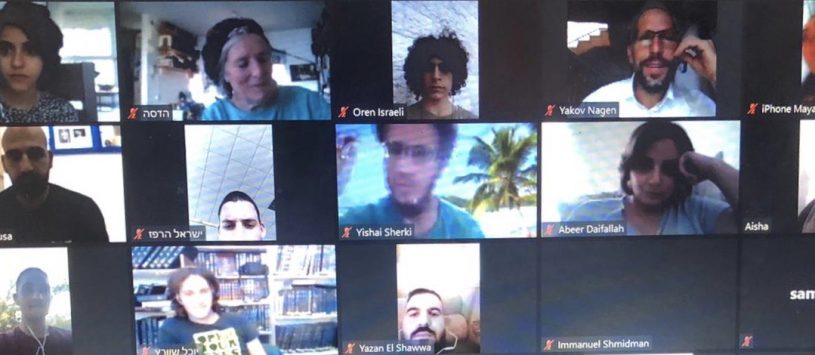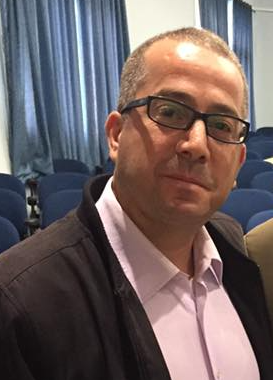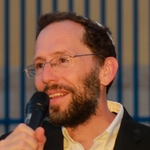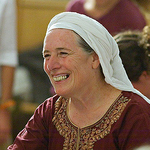
Tuesday 25th August 2020
Written by: Mohamad Jamous
“Darkness cannot drive out darkness; only light can do that. Hate cannot drive out hate; only love can do that.” — Rev. Dr. Martin Luther King, Jr.
Due to the outbreak of the COVID pandemic, which we pray will end soon,
for more than five months, the Abrahamic Reunion in Palestine, has been holding their monthly meetings by Zoom.
Prior to the pandemic, Zoom was not common in this region, but three months ago, Abd al-Salam Manasra, the Abrahamic Reunion’s director in Israel, and I, Mohamad Jamous the director in Palestine, began to use Zoom to host joint multi-religious meetings between youth from Israel and Palestine. Normally, it is very difficult for the youth in our two countries to meet due to the many travel restrictions we have. Indeed, in the previous two months our Zoom meetings for youth have been among the most wonderful and beautiful meetings that the Abrahamic Reunion has ever sponsored.
Today, I am writing about the Abrahamic Reunion’s third youth meeting, which had more than 40 Palestinian and Israeli, male and female, youth, in addition to the following distinguished speakers who imprinted this meeting with love and light!
1- Rabbi Yaakov Nagen (Co-Chairman of the Abrahamic Reunion)
2- Sheikh Khaled Abu Ras
3- Rabbinit Hadassah Froman

After Abdul Salam Manasra, and I each delivered a short welcome speech for the Palestinian and Israeli participants. Sheikh Ghassan Manasra, the International Director of the Abrahamic Reunion, spoke in Arabic and Hebrew to tell the story of the prophet Joseph, peace be upon him.
Click below to view or download the story of Joseph in PDF.

He then invited Sheikh Khaled Abu Ras to speak, and the Sheikh said:
“Regarding this story of the prophet Joseph, peace be upon him, – according to the Holy Qur’an, which is the sacred book for the Muslims, Joseph was betrayed by his brothers, because he was given many things that they were not given. There are many lessons and teachings in this story:
1- Envy and jealousy will make a brother conspire against his brother, so every person must rid himself of these traits.
2- It is also a statement about the kindness and care of God Almighty, who saves His guardians from adversity, and raises their status, and protects them.
3- It is a statement about the truthfulness of God’s visions, and how God provides the visionary with insight that enables him to distinguish what is true from what is false.
4- It is a statement about the mercy of God Almighty. In this story Jacob makes many mistakes, and was blind both physically and metaphorically, but in spite of Jacob’s shortcomings, God restored Jacob’s vision and reunited him with his sons. And God showed Joseph mercy and compensated him for all the tribulations he went through.
Finally, I want to say that Yusef is mentioned in three different places in the Noble Qur’an, namely in Surat Yusuf, Surat Al An’am and Surat Ghafir.

Rabbi Nagen spoke next. He began by Congratulating the Muslims on the New Hijri year that began a few days ago. Then he spoke about the story of Joseph from the perspective of Jewish biblical sources. He also told a story about his cousin, Professor Ariel Simon, who, when he read the story of Joseph from the Torah, was so moved that he wept when he read what Joseph’s brothers did to him! Rabbi Nagen also talked about other brotherhood stories in the Torah, such as the story of “Cain and Abel,” and how Cain had killed his brother Abel, and what had happened between the two brothers “Ishmael and Isaac” And the sons of Isaac. “Jacob and Esau.” May blessings and peace be upon them all!
At the end of his speech, Nagen shared a quote from the Zohar, (a group of books on Jewish mysticism), which says, “How beautiful it is for us to be brothers together with each other. “
After these speeches, Sheikh Ghassan Manasra opened a dialogue for the participants, who were all eager to speak!
A 31 year old Palestinian participant, Alaa Salah al-Din, from Ramallah said:
One of the lessons that we can take from this story is that the treatment of children should be equal. Perhaps it may happen involuntarily that some parents, or mothers, prefer some of their children above others, and this is a big mistake. Mothers and fathers must treat all their children equally, regardless of their inner feelings, so they will not provoke hatred between their children.
Rabbi Yaakov Nagen said: “According to the Zohar, envy leads to hatred, and what happened between the sons of our prophet Jacob, peace be upon him, was envy, which ultimately led to hatred.”
A 33 year old Palestinian participant, Abeer Daif-Allah, from Ramallah said: Two things have impressed me from this story: First I learned that harm may come to you from the people closest to you, and secondly, “Investing time.” I learned from Joseph’s example that despite the pain he was in, when he was in prison, he invested his time in changing the morals of his fellow prisoners. Joseph invested his time to do something useful.
A 25 year old Israeli participant, named Yuval, said: When they saw the light that emanated from Joseph. They wanted to be like him, so they hurt him.

Rabbinit Hadassah Froman commented on what Yuval said:
“The light or beauty that our master Joseph had at the beginning was not pure. His father had warned Joseph not to speak about his vision to his brothers, and when Joseph spoke about this matter in front of his brothers, he spoke from his ego, but later the vision became acceptable because Joseph had gotten rid of his ego.”
Aisha Subeh, a 29 year old Palestinian participant from Bethlehem said: “Personally, I consider Surat Joseph one of the most beautiful chapters in the Holy Quran. It contains so many lessons and teachings! The teachings in Surat Joseph are complex, and they show us more than one lesson. One of these lessons is that attachment to something other than God can evolve into something undesirable. Joseph’s father, our prophet Jacob, had a great attachment for his son, and this attachment lead to something very complicated. This Surat also shows us the plots of women, the plots of brothers, and the plots of the Devil, but we discover that the plot of the Devil, was the weakest plot of all!! In Surat Al-Nisa ‘verse 76 we learn that the plot of the Devil is weak because it is confined to the realm of obsession, unless he finds a fertile soul to achieve his plot”.
Mohamad Jamous, the Palestinian Director of the Abrahamic Reunion, shared: “I want to add a short lesson I learned from this story of Joseph, and that is that empowerment does not come until after examinations and afflictions: Joseph, peace be upon him, went through many painful trials, which he passed with strength, faith and patience, and eventually his reward from God was that he received empowerment on earth when he became close to the king, and assumed his position as head of the treasury”.
Manuel, a 27 year old Israeli participant said: The ego contaminates the path of a person’s life. These things happened to Joseph, after his father had warned him: “Do not tell your vision to your brothers.” Which meant, don’t let your ego control you, you do not see things clearly, only the soul that is in you sees clearly.
At 7:30 after the dialogue session ended, Sheikh Ghassan Manasra thanked all those who attended this wonderful meeting and hoped to meet them again next month with a new story from the prophets!

